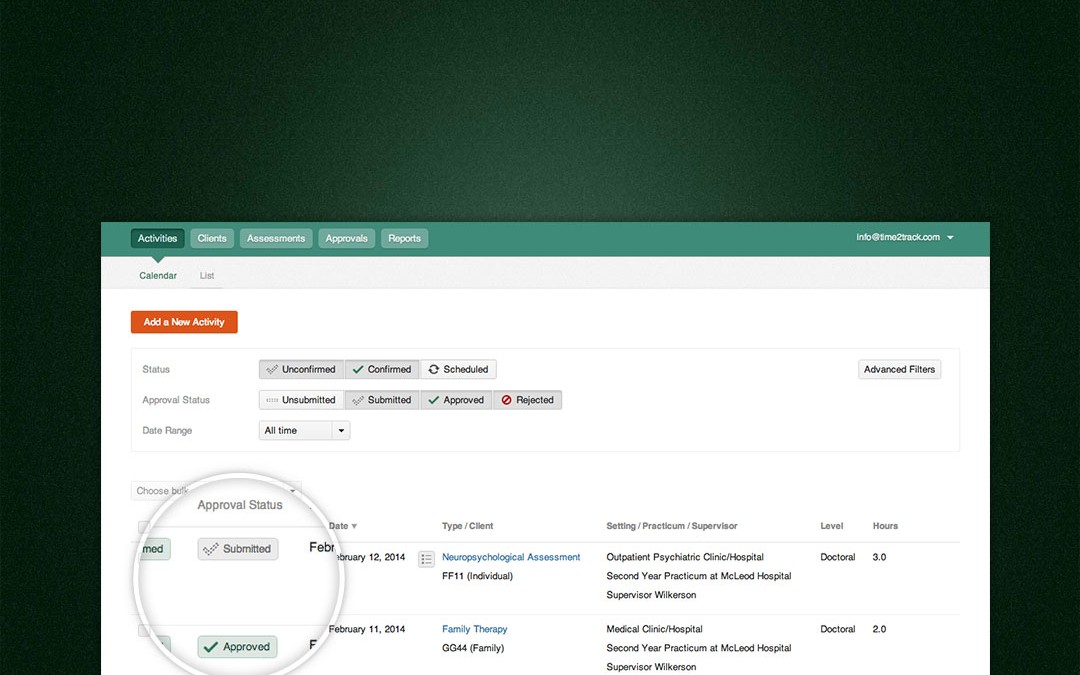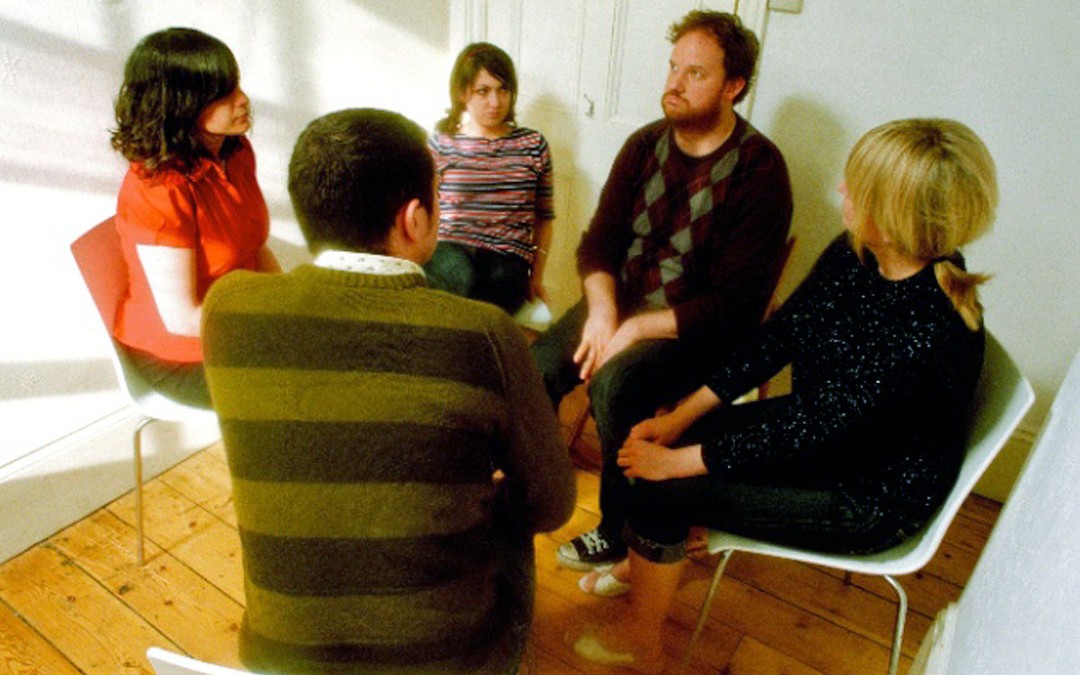Time2Track Blog
Real-Life Resources for Students & Early Career Professionals

Time2Track.com has a New Look!
We’ve been hard at work revamping our website to provide better information and a better user experience. Don’t worry though, the Time2Track app you all know and love hasn’t changed.

Time2Track’s New Updates & Enhancements – February, 2014
You may have noticed some changes to Time2Track the last time you logged into your account. We’re continually working to improve Time2Track, so we’ve recently upgraded a few features and made some visual changes. The changes shouldn’t affect you too much, but we still wanted to share them with you.

Time2Track Online Supervisor Approval
We are excited to announce a powerful new Time2Track feature – Online Supervisor Approval.
With input from our institutions, students, and others, the new online supervisor approval process will improve the practicum hours approval process for your students and supervisors, improve the accuracy and reliability of practicum data, and save a significant amount of both time and paper.

Time2Track Analytics: Obtain Data for APA Accreditation & More
It’s time to move beyond simply tracking hours. At Time2Track, we are continuing to pioneer the management of clinical training data by building learning systems that help institutions in ways never before available. We believe it’s a vital development for the future of clinical training.
Transform clinical training data into actionable information with Time2Track Analytics.

Clarifying Supervision Goals for Psychology Students & Supervisors
This is the final blog post in a three-part series exploring topics related to graduate students’ practicum and internship experiences.
The first post focused on how students can track clinical hours in a way that is meaningful, and the second post looked at the features of an effective practicum or internship plan.
In the current post, several complexities of supervision during practicum/internship are identified, and ways to achieve clearer supervision expectations are discussed.
The post is based on the big idea that supervision is a pivotal part of practicum/internship experiences, but supervision processes need increased clarity for students and supervisors to be maximally effective. The content is adapted from my recently published book Demystifying the School Psychology Internship: A Dynamic Guide for Interns and Supervisors (New York: Routledge).
Definition and Goals of Supervision
Supervision is generally recognized as the signature pedagogy in psychology.

Obtaining a Mental Health Counseling Internship or Fieldwork Placement
The phone rings and it’s EXACTLY who you want it to be. The director of the local hospital has heard about your stellar first year as a counseling grad student and is offering you an internship! It’s a dream come true…then you wake up.
It WAS a dream. The reality is obtaining a placement is something that all counseling students must go through. While it would be wonderful if your performance in school could speak for you, it turns out you will need to beat the pavement to get a placement. Below are six steps that you can take to make the process less painful.
1. Be Proactive.
This means a little more than sending an email a day. As soon as you find out what your requirements are for the placement, schedule a time to meet with your academic advisor or placement coordinator to discuss potential places for your internship.
Pick the brains of students who have already begun an internship and find out if their agency is looking for additional interns. Be sure to check your email regularly for opportunities gleaned by your placement advisor.

Preparing to be a Great Job Candidate in the World of Psychology
Constructing your curriculum vita (CV), asking for letters of recommendation and writing a cover letter may seem like the first steps involved in obtaining an internship or professional position after graduate school, but in reality, your preparation for going on the job market begins much earlier.
The relationships you have built and experiences you have had during your graduate training are the actual preparation.
The CV, cover letter, and recommendation letters are simply the mechanisms through which you inform your potential future employer about these relationships and experiences.
The purpose of this blog post is to offer some tips for those of you who are in the early or middle parts of your graduate career to help you seek out the relationships and experiences that will make you a better candidate once you seek professional employment as well as to help those of you who are nearing the end of your graduate career identify what you have already done right and where you could focus your attention in the last year or two you have left.

4 Ways to Make the Most of your Counseling Internship Experience
The process of finding an internship can be daunting. Perhaps you had to find one on your own, or maybe you were assigned a site by your school. In my case, I had to find my own internship and I needed it to coordinate with my full-time work hours. Hard? Yes! Impossible? Not at all.
Reflecting back on the internship experience brings me to this series of posts. Check out tips on securing your internship, and once you’ve secured one, here are some ways that you can make the best of your experience.
1. Try It On
Internships are not just a degree requirement; they’re a great way to try on your new role as a Mental Health Counselor.
Convinced you want to work with adolescents? Try it on for size in your internship. Internship sites might have a defined role for you, but there’s no harm done in citing your interests.

Please Come Back: The Common Pitfalls of a New Therapist
Building long-lasting relationships with clients is a skill to aim for if you ever plan to have a private practice. Treatment attrition is something I frequently experienced at the beginning of my career, and it took me several years to figure out how to provide better services.
The number of assertive therapeutic interventions per session increases only with time and practice. There are, however, some pitfalls that a beginner therapist can avoid.
My Experiences
At the beginning, I often took a lot of notes on the first session and designed elaborate treatment plans. Doing all of this at once was as complicated as learning to fly an airplane.
The problem is that I often failed in creating a safe emotional container for the client.
Although finding appropriate techniques and designing remarkable treatment plans were some terrific strategies I learned in school, I wish somebody had pointed out the basic and avoidable mistakes I was making. I did not understand why some clients canceled sessions or stopped coming altogether.

Developing as a Therapist
Throughout your career as a therapist, you will continue to learn, gain in experience, and develop your own set of priorities and values within the work you do.
A sense of progress and growth is essential in order to keep your interest and enthusiasm for your work alive.
Professional Growth
Studies into the reasons why therapists choose their work and stay in the profession have shown that there is a widespread desire amongst the therapist community to continue learning.
Professional growth is one of the main areas that therapists attribute to preventing burn out and keeping their focus.
There are always new ideas and developments emerging in our field, and as part of what we do, we are always encouraging people to learn more in order to grow and develop as a person. So inevitably that is something we also should be doing ourselves.
Setting Goals
Most jobs or study courses have a set of goals as part of an on-going assessment scheme. However, for personal and professional development, many therapists choose to set goals in addition to the ones required by their supervisor or job.
